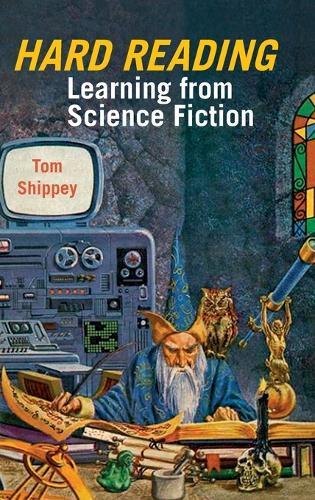Overview
An Open Access edition of this book is available on the Liverpool University Press website and the OAPEN library. The fifteen essays collected in Hard Reading argue, first, that science fiction has its own internal rhetoric, relying on devices such as neologism, dialogism, semantic shifts, the use of unreliable narrators. It is a “high-information” genre which does not follow the Flaubertian ideal of le mot juste, “the right word”, preferring le mot imprévisible, “the unpredictable word”. Both ideals shun the facilior lectio, the “easy reading”, but for different reasons and with different effects. The essays argue further that science fiction derives much of its energy from engagement with vital intellectual issues in the “soft sciences”, especially history, anthropology, the study of different cultures, with a strong bearing on politics. Both the rhetoric and the issues deserve to be taken much more seriously than they have been in academia, and in the wider world. Each essay is further prefaced by an autobiographical introduction. These explain how the essays came to be written and in what ways they (often) proved controversial. They, and the autobiographical introduction to the whole book, create between them a memoir of what it was like to be a committed fan, from teenage years, and also an academic struggling to find a place, at a time when a declared interest in science fiction and fantasy was the kiss of death for a career in the humanities.
Full Product Details
Author: Tom Shippey
Publisher: Liverpool University Press
Imprint: Liverpool University Press
Volume: 53
Dimensions:
Width: 16.30cm
, Height: 16.30cm
, Length: 23.90cm
Weight: 0.680kg
ISBN: 9781781382615
ISBN 10: 1781382611
Pages: 351
Publication Date: 23 February 2016
Audience:
Professional and scholarly
,
Professional & Vocational
,
Postgraduate, Research & Scholarly
Format: Hardback
Publisher's Status: Active
Availability: In Print 
This item will be ordered in for you from one of our suppliers. Upon receipt, we will promptly dispatch it out to you. For in store availability, please contact us.
Table of Contents
List of Figures Note on References A Personal Preface What SF Is 1 Coming Out of the Science Fiction Closet ‘Learning to Read Science Fiction’ 2 Rejecting Gesture Politics ‘Literary Gatekeepers and the Fabril Tradition’ 3 Getting Away from the Facilior Lectio ‘Semiotic Ghosts and Ghostlinesses in the Work of Bruce Sterling’ SF and Change 4 Getting Serious with the Fans ‘Science Fiction and the Idea of History’ 5 Getting to Grips with the Issue of Cultures … ‘Cultural Engineering: A Theme in Science Fiction’ 6 … And Not Fudging the Issue! ‘“People are Plastic”: Jack Vance and the Dilemma of Cultural Relativism’ 7 SF Authors Really Mean what they Say ‘Alternate Historians: Newt, Kingers, Harry and Me’ 8 A Revealing Failure by the Critics ‘Kingsley Amis’s Science Fiction and the Problems of Genre’ 9 A Glimpse of Structuralist Possibility ‘The Golden Bough and the Incorporations of Magic in Science Fiction’ 10 Serious Issues, Serious Traumas, Emotional Depth ‘The Magic Art and the Evolution of Words: Ursula Le Guin’s “Earthsea” Trilogy’ SF and Politics 11 A First Encounter with Politics ‘The Cold War in Science Fiction, 1940–1960’ 12 Language Corruption, and Rocking the Boat ‘Variations on Newspeak: The Open Question of Nineteen Eighty-Four’ 13 Just Before the Disaster ‘The Fall of America in Science Fiction’ 14 Why Politicians, and Producers, Should Read Science Fiction ‘The Critique of America in Contemporary Science Fiction’ 15 Saying (When Necessary) the Lamentable Word ‘Starship Troopers, Galactic Heroes, Mercenary Princes: The Military and its Discontents in Science Fiction’ References Index
Reviews
Those unfamiliar with Shippey's work in this area are in for a treat.Edward James, Foundation
'This is an engaging and thought-provoking (or debate-provoking) selection of work.' Jack Fennell, Fantastika 'In Hard Reading, Shippey discusses a wide-ranging variety of authors whose work has a clearly unacknowledged Wellsian streak. As a collection of essays written over a period of the past fifty years or so, Shippey's book demonstrates an increasing density and intricacy of academic style and approaches practised in SF studies.' Oksana Blashkiv, The Wellsian: The Journal of the H.G. Wells Society 'Those unfamiliar with Shippey's work in this area are in for a treat.' Edward James, Foundation
In Hard Reading, Shippey discusses a wide-ranging variety of authors whose work has a clearly unacknowledged Wellsian streak. As a collection of essays written over a period of the past fifty years or so, Shippey's book demonstrates an increasing density and intricacy of academic style and approaches practised in SF studies.Oksana Blashkiv, The Wellsian: The Journal of the H.G. Wells Society Those unfamiliar with Shippey's work in this area are in for a treat.Edward James, Foundation
This is an engaging and thought-provoking (or debate-provoking) selection of work. Jack Fennell, Fantastika In Hard Reading, Shippey discusses a wide-ranging variety of authors whose work has a clearly unacknowledged Wellsian streak. As a collection of essays written over a period of the past fifty years or so, Shippey's book demonstrates an increasing density and intricacy of academic style and approaches practised in SF studies. Oksana Blashkiv, The Wellsian: The Journal of the H.G. Wells Society Those unfamiliar with Shippey's work in this area are in for a treat. Edward James, Foundation
Author Information
Tom Shippey is Professor Emeritus at Saint Louis University and has published widely, especially on J. R. R. Tolkien. He was special academic advisor to director Peter Jackson for the Lord of the Rings/Hobbit films.
Tab Content 6
Author Website:
Customer Reviews
Recent Reviews
No review item found!
Add your own review!
Countries Available
All regions
|




